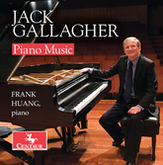by Daniel Hathaway

Of the nine works Gallagher has chosen, six date from the 1970s, one each from 1989 and 1998, and one from 2000, although many have been revised since their original composition. Four of them are dedicated to Gallagher’s wife (the Sonata from 1973, the Nocturne of 1976, the Pastorale of 1979, and Happy Birthday, April from 1976), one to his parents (the Sonatina of 1976), and one to his daughter for her eighth birthday in 1989 (Six Pieces for Kelly). And each of the Six Bagatelles of 1979 is dedicated to a different friend or colleague.
Piano music written in the 1970s comes in two flavors: a mathematically-based, academic style which many admire but hardly anyone really likes, and a more accessible, neo-classical style that builds on previous music. Gallagher clearly embraces the latter.
The composer writes in the liner notes that he began his musical studies on the accordion, and the piano is not his primary instrument. He goes on to say:
The tactile quality of the piano always has seemed to me reassuring, encouraging a desire to compose works that “lie under the hands” congenially and idiomatically, even if informed by a non-virtuoso’s understanding of the medium. Perhaps this helps explain why the ethos and technical means of these works attempt to convey an essential affability.
Indeed, the Sonata opens the album with friendly, welcoming gestures, drawing the listener in with long, lyrical lines reminiscent of Hindemith, though the resulting harmonies are more winsome.
Gallagher freely discloses other compositional antecedents in his notes to the Nocturne: “It seeks to evoke reminiscences of the lyrical Romanticism found in nocturnes of Chopin and John Field.”
The composer demonstrates his widest range of influences in the short movements of the Six Bagatelles and the Six Pieces for Kelly — the latter intended for young performers with its cheerful “March,” gentle “Lullaby,” sprightly “Piping Song,” tender “Chanson d’Insouciance,” wistful “Folk Song,” and energetic “Balkan Dance.”
Some individual movements have been repurposed since their original conception. Perhaps the most interesting case is the Sonatina’s second movement, the enlargement of a lullaby originally written for the daughter of friends. Gallagher later orchestrated the movement and renamed it Berceuse. You can hear it in a recording by the London Symphony under JoAnn Falletta.
The most recent work, Malambo Nouveau, was originally commissioned in 2000 by Boston composer-pianist Carson Cooman as a brief concert encore. Gallagher beefed it up in 2009 into a driving, six-minute work with infectious rhythms. After that, Jack Gallagher closes the album with a lovely, pop-influenced love song to his wife.
Pianist Frank Huang took on a big chunk of music with this project, and he performs it with commitment and flair. Huang has a habit of pausing ever so briefly before resolutions and cadences, a personal tic that soon begins to call attention to itself. And missed notes are scattered throughout the recording.
Overall, Jack Gallagher Piano Music is an entirely pleasant listening experience, a personal collection of music that the composer has graciously agreed to share with the rest of us.
Published on ClevelandClassical.com December 13, 2016.
Click here for a printable copy of this article



